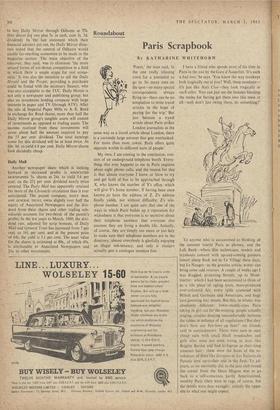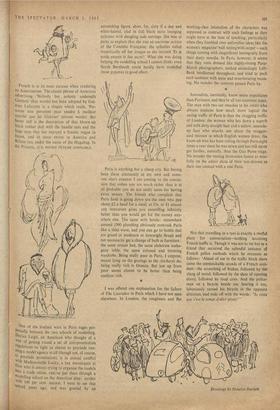Roundabout
Paris Scrapbook
By KATHARINE WHITEHORN 'PARIS,' the man said, 'is the one really relaxing town for a journalist to go to. So many men on
My own, I am coming to the conclusion, con- sists of an underground telephone booth. Every- thing that ever happens to me in Paris reqtiires about eight phone calls; and the reason for this is that almost everyone I know or have to try and get hold of has to be approached through X, who knows the number of Y's office, which will give Y's home number; Y having been once known to have the address of Z. Z's address finally yields, not without difficulty, Z's tele- phone number. I am quite sure that one of the ways in which Paris builds up a reputation for wickedness is that everyone is so secretive about their telephone numbers that everyone else assumes they are living a double life. Actually, of course, they are simply too mean or too lazy to make sure their telephone numbers are in the directory; almost everybody is gleefully enjoying an illegal sub-tenancy, and only le titulaire actually gets a catalogue mention free. I have a friend who spends, most of his time in Paris in the zoo by the Gare d'Austerlitz.'It's such a bad zoo,' he says. 'You know the way monkeys look tragically out at you? Well, these monkeys— it's just like Huis Clos—they look tragically at each other. You can just see the females blaming the males for having got them into this mess at all—well don't just swing there, do something!'
To anyone who is accustomed to thinking of the summer tourist Paris as phoney, and the Left Bank—where film technicians, models and layabouts consort with up-and-coming painters (smart sheep flock not to Le Village these days, but Le Nuage)—as the genuine article, winter can bring some odd reverses. A couple of weeks ago I was dragged, protesting fiercely, up to Mont- martre: which I had been accustomed to think of as a vile place of ogling touts, mass-produced over-coloured Art, every table crammed with British and Germans and Americans, and huge cars jamming tiny streets. But this, in winter, was absolutely different: lower-middle-class Paris taking its girl out for the evening: people actually singing. couples dancing uncomfortably between the tables in defiance of all regulations ('But they don't have any bye-laws up here!' my friends said in astonishment). There were men in neat cheap suits with small black moustaches and girls who were not even trying to look like Brigitte Bardot and had kirbigrips in their long unsmart hair: these were the faces of the re- volution; of films like Gervaise or Les Enfants du Paradis seen up-to-date and in the flesh. To ad- journ, as we inevitably did, to the jazz club round the corner from the Deux Magots was to go back to a self-conscious, partly Americanised, wealthy Paris (they were in rags, of course, but the drinks were dear enough): exactly the oppo- site to what one might expect. French is at its most curious when rendering an Americanism. The classic phrase of American advertising 'Nobody but nobody undersells Gimbels' (five words) has been adopted by Gal- Cries Lafayette in a slogan which reads. 'Per- sonne non personnc peut vendre is meilleur march6 que les Galeries' (eleven words). But better still is the description of that blown-up black rubber doll with the handle ears and the huge eyes that has enjoyed a fanatic vogue in Japan, and to sonic extent in America and Britain too, under the name of the Hugabug. In the Prisunic, it is POLITE FE1ICIIE GONFLABLE.
One of the liveliest wars in Paris rages per- petually between the two schools of modelling. Dorian Leigh, an American who thought of a way of getting round a set of anti-prostitution regulations so tight as almost to preclude run- ning a model agency at all (though not, of course, to preclude prostitution), is in annual conflict with Mademoiselle Lucky, a key mannequin at plor who is always trying to organise the models Into a trade union, and/or put them through a modelling school on the American plan: neither with 100 per cent. success. I went to sec that school years ago, and was greeted by an astonishing figure, short, fat, sixty if a day and white-haired, clad in full black satin lounging pyjamas with dangling jade earrings. She was at pains to explain that she was an ancienm' actrice of the Comedie Frangaise; the syllables rolled majestically off her tongue as she intoned 'Et je tends encore lc feu sacre !' What she was doing helping the modelling school I cannot think; even Sarah Bernhardt could hardly have modelled those pyjamas to good effect.
Paris is anything but a cheap city. But having been there alternately at my own and some- one else's expense I am coming to the conclu- sion that unless you are much richer than is at all probable you do not really score for having extra money. The friends who complain that Paris food is going down are the ones who pay about £2 a head for a meal; at 15s. or £1 almost any restaurant gives you something infinitely better than you would get for the money any- where else. The same with hotels: somewhere around 1900 plumbing obviously overtook Paris like a tidal wave, and you can go to hotels that arc grand or mediocre or downright fleapit and not necessarily get a change of bath or furniture: the same ornate bed, the same elaborate maho- gany table, the same colossal and tottering wardrobe. Being really poor in Paris, 1 suppose, means lying on the gratings as the clochards do, being really rich is Onassis. But just up from poor seems almost to be better than being medium rich.
I was offered one explanation for the failure of The Caretaker in Paris which I have not seen elsewhere. In London, the roughness and flat working-class intonation of the characters was supposed to contrast with such feelings as they might have at the time of speaking; particularly when they fumbled over unfamiliar ideas like the women's magazine 'wall toning with carpet'—such things coming with magnificent incongruity from their dusty mouths. In Paris, however. it seems that they were dressed like highly-strung Paris- Match photographers, looked exceedingly Left- Bank intellectual throughout, and tried to pack each sentence with tense and reverberating mean- ing. No wonder the contrast passed Paris by.
*
Journalists, inevitably, know more expatriates than Parisians; and they're all too recurrent types. The man with two car smashes to his credit who always explains how much more logical the racing traffic of Paris is than the chugging traffic of London. the woman who lets down a superb suit with dirty straight hair and a sallow, unmade- up face who attacks one about the exagger- ated manner in which English women dress; the know-all who has been rolling through Paris eight times a year since he was seven and has still never got further, mentally, than the Gay Paree stage. No wonder the visiting firewomen fasten so wist- fully on the ()biter dicta of their taxi-drivers as their one contact with a real Paris.
Not that travelling in a taxi is exactly a restful place for conversation—nothing involving French traffic is. Though it was not to me but to a friend that occurred the splendid instance of French police methods which he recounts as follows: 'Ahead of me in the traffic block there came the unmistakable sounds of a French acci- dent—the screeching of brakes, followed by the clang of metal, followed by the slam of opening doors, followed by loud cries. And the police- man on a bicycle beside me, hearing it too, laboriously turned his bicycle in the opposite direction,-and rode off with the words: "le crois que c'est le temps d'aller pisser."'
Drawings by Maurice Bartlett







































 Previous page
Previous page